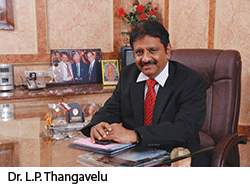 Inordinate delay in undergraduate admissions to Tamil Nadu’s 22 government medical colleges, the state-managed Raja Muthiah Medical College (RMMC) of Annamalai University and 10 private medical colleges is causing great stress and anxiety to 32,570 students who qualified for admission into these colleges in the National Eligibility-cum-Entrance Test (NEET) UG 2017 — decreed as the sole entrance exam for admission into all medical and dental colleges in the country by the Supreme Court on April 11, 2016.
Inordinate delay in undergraduate admissions to Tamil Nadu’s 22 government medical colleges, the state-managed Raja Muthiah Medical College (RMMC) of Annamalai University and 10 private medical colleges is causing great stress and anxiety to 32,570 students who qualified for admission into these colleges in the National Eligibility-cum-Entrance Test (NEET) UG 2017 — decreed as the sole entrance exam for admission into all medical and dental colleges in the country by the Supreme Court on April 11, 2016.
This delay is an outcome of the ongoing legal battle challenging the validity of the incumbent AIADMK’s government order of June 22 reserving 85 percent of undergraduate government medical seats (after surrendering the mandatory 15 percent to the all-India pool) for class XII school-leavers of schools affiliated with the Tamil Nadu State Board of School Education (TNSBSE), leaving a mere 15 percent of seats for students from schools affiliated with CISCE, CBSE and other pan-India examination boards.
The objective of the AIADMK government’s reservation order is to ensure that state board students aren’t shut out of the state’s 22 government, the state-managed RMMC and 10 private medical colleges — which together account for 2,445 government seats out of a total of 2,880. (It is mandatory for the state to surrender 435 seats to the all-India pool). There’s pervasive fear within the state government that because of the mediocre performance of TNSBSE students in NEET 2017, which they contend is based on the CBSE syllabus, a majority of students admitted into Tamil Nadu’s government medical colleges will be high scorers from CBSE and CISCE-affiliated schools.
Somewhat inevitably, the state government’s June 22 order was quashed on July 14 by a single judge of the Madras high court (Justice K. Ravichandrababu) who heard a batch of 60 writ petitions filed by class XII school-leavers of CBSE-affiliated schools, contending that the government order was discriminatory and compromises merit in admissions into medical colleges. Slamming the state government for meting out step motherly treatment to CBSE-affiliated school students, Justice Ravichandrababu said: “Merely because CBSE school students obtained more marks in NEET 2017 than TNSBSE students, can they be denied their legitimate right to secure admission into medical colleges of their choice by imposing the impugned reservation?... Such reservation meddles with the object and process of the NEET and violates students’ right to equality guaranteed under Article 14 of the Constitution.”
Unwilling to relent, the AIADMK government has appealed the single judge’s order before a division bench of the high court. Moreover, in Plan B the state government is also considering promulgation of an ordinance which will exempt students seeking admission into state government medical colleges from writing NEET for at least two years. A team of state ministers reportedly rushed to New Delhi on July 24 and met prime minister Narendra Modi and other Union ministers to get the newly sworn-in President Ram Nath Kovind’s assent for two Bills passed by the assembly on February 1 which exempt Tamil Nadu students from writing NEET for two years.
Although the AIADMK government is yet to release the merit list for NEET 2017, initial analysis of the results and number of applications received by the Directorate of Medical Education confirms the worst fears of the government about the capability of TNSBSE students to compete with school-leavers of other exam boards. Out of 30,122 candidates for 2,445 seats in government medical colleges, 26,693 are from TNSBSE schools and 3,429 from CBSE and other exam board-affiliated schools. According to directorate of medical education officials, over 1,400 state board students and around 1,000 from CBSE and other boards were expected to secure government college admission.
Informed monitors of Tamil Nadu’s confusing education scene are unanimous that reservation of seats in the state’s too-few medical colleges for students of TNSBSE schools isn’t the solution to the problem. They ascribe the disproportionately large number of NEET top scorers from the state’s 52 CISCE and 580 CBSE schools to the poor quality of education and textbooks (see cover story) offered by the 53,000 government and 10,934 private schools affiliated with TNSBSE. “The TNSBSE curriculum has been dumbed down and exam question papers don’t test students’ analytical and knowledge application skills. Instead of reserving seats, the state government should focus on improving the learning outcomes of students in TNSBSE-affiliated schools by giving them access to the best textbooks, training teachers adequately and providing a level playing field, which will enable them to compete with students of CBSE, CISCE and other boards,” says Dr. L.P. Thangavelu, founder-promoter of the PPG Group of Institutions, Coimbatore, and member of the Medical Council of India and Tamil Nadu Medical Council.
Ironically, even as the AIADMK government is fighting tooth and nail to reserve 85 percent of seats in the state’s 33 government and private medical colleges for state board school-leavers, the latter are in favour of admissions based on NEET scores. Most school-leavers who have written NEET believe changes in the admission criteria at this point, will further ruin their chances of securing admission into medical colleges in the state and beyond.
Hemalatha Raghupathi (Chennai)